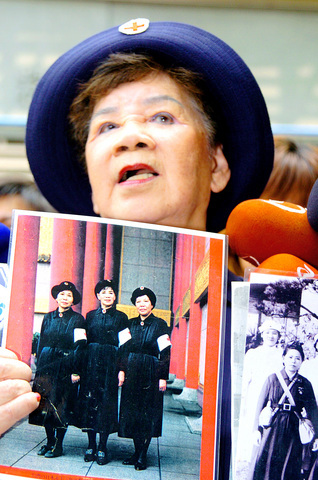A coalition of veterans who served in the Japanese military during World War II and their families protested outside the legislature yesterday, voicing support for Taiwan Solidarity Union (TSU) Chairman Shu Chin-chiang's (蘇進強) visit to Tokyo's Yasukuni Shrine.
Bearing banners with the words "ignorant, audacious May Chin (
May Chin on Tuesday evening led protesters at CKS International Airport to meet Shu and eight other TSU members returning from Japan. Shu was jostled by the protesters and pelted with eggs as he headed for the exit.

PHOTO: SEAN CHAO, TAIPEI TIMES
The Yasukuni Shrine is dedicated to Japan's 2.5 million war dead and lists the names of 28,000 Taiwanese and 21,000 Korean soldiers, most of whom were forced to serve in the Japanese army.
Yesterday's protest later moved into the legislature to hold a press conference at the TSU caucus office. Taiwanese independence activist Su Beng (史明) said the Chinese Nationalist Party (KMT) should be held responsible for the controversy over Shu's visit to the shrine.
"Not only does Shu's trip make sense, but the timing was also right," he said. "I don't understand why Taiwanese people cannot pay respect to our own people."
Su said the Chinese Nationalist Party (KMT) government maliciously abandoned Taiwanese veterans after World War II ended.
About 200,000 Taiwanese were recruited as "volunteers" to fight for the Japanese in Southeast Asia during the war. About 30,000 died.
Instead of bringing the remaining 170,000 survivors home, the KMT government turned its back on them, Su said.
Chen Chun-chin (
"I don't know why it is wrong to visit my old comrades or let others pay their respects to them on my behalf," said Chen, 81, who survived the war after serving for one-and-a-half years.
Chen said his association had asked previous KMT governments on three occasions to seek compensation from the Japanese on their behalf, but to no avail.
"Then-premier Lien Chan (
TSU caucus whip Lo Chih-ming (羅志明) said that his party would endeavor to help Taiwanese men forced to serve as Japanese soldiers and Taiwanese women who served as sex slaves to seek compensation from the Japanese government.
Lo also said that his party would collect information on the 28,000 Taiwanese whose names are listed at the Yasukuni Shrine and build a shrine for them in Taiwan.
Chairwoman of the Association for Taiwan Independence Yin Tsu-chi (
"If she's speaking for the Chinese, I don't think she's qualified," Yin said. "If she's speaking for the Taiwanese, she seems to be clueless about the history of Taiwan and Taiwanese values."

SECURITY: As China is ‘reshaping’ Hong Kong’s population, Taiwan must raise the eligibility threshold for applications from Hong Kongers, Chiu Chui-cheng said When Hong Kong and Macau citizens apply for residency in Taiwan, it would be under a new category that includes a “national security observation period,” Mainland Affairs Council (MAC) Minister Chiu Chui-cheng (邱垂正) said yesterday. President William Lai (賴清德) on March 13 announced 17 strategies to counter China’s aggression toward Taiwan, including incorporating national security considerations into the review process for residency applications from Hong Kong and Macau citizens. The situation in Hong Kong is constantly changing, Chiu said to media yesterday on the sidelines of the Taipei Technology Run hosted by the Taipei Neihu Technology Park Development Association. With

CARROT AND STICK: While unrelenting in its military threats, China attracted nearly 40,000 Taiwanese to over 400 business events last year Nearly 40,000 Taiwanese last year joined industry events in China, such as conferences and trade fairs, supported by the Chinese government, a study showed yesterday, as Beijing ramps up a charm offensive toward Taipei alongside military pressure. China has long taken a carrot-and-stick approach to Taiwan, threatening it with the prospect of military action while reaching out to those it believes are amenable to Beijing’s point of view. Taiwanese security officials are wary of what they see as Beijing’s influence campaigns to sway public opinion after Taipei and Beijing gradually resumed travel links halted by the COVID-19 pandemic, but the scale of

A US Marine Corps regiment equipped with Naval Strike Missiles (NSM) is set to participate in the upcoming Balikatan 25 exercise in the Luzon Strait, marking the system’s first-ever deployment in the Philippines. US and Philippine officials have separately confirmed that the Navy Marine Expeditionary Ship Interdiction System (NMESIS) — the mobile launch platform for the Naval Strike Missile — would take part in the joint exercise. The missiles are being deployed to “a strategic first island chain chokepoint” in the waters between Taiwan proper and the Philippines, US-based Naval News reported. “The Luzon Strait and Bashi Channel represent a critical access

Pope Francis is be laid to rest on Saturday after lying in state for three days in St Peter’s Basilica, where the faithful are expected to flock to pay their respects to history’s first Latin American pontiff. The cardinals met yesterday in the Vatican’s synod hall to chart the next steps before a conclave begins to choose Francis’ successor, as condolences poured in from around the world. According to current norms, the conclave must begin between May 5 and 10. The cardinals set the funeral for Saturday at 10am in St Peter’s Square, to be celebrated by the dean of the College